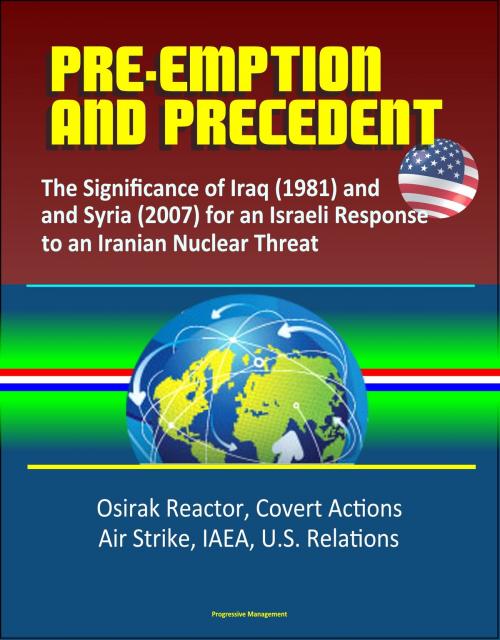Pre-Emption and Precedent: The Significance of Iraq (1981) and Syria (2007) for an Israeli Response to an Iranian Nuclear Threat - Osirak Reactor, Covert Actions, Air Strike, IAEA, U.S. Relations
Nonfiction, History, Military, Nuclear Warfare, Middle East, Israel| Author: | Progressive Management | ISBN: | 9781310651410 |
| Publisher: | Progressive Management | Publication: | June 5, 2016 |
| Imprint: | Smashwords Edition | Language: | English |
| Author: | Progressive Management |
| ISBN: | 9781310651410 |
| Publisher: | Progressive Management |
| Publication: | June 5, 2016 |
| Imprint: | Smashwords Edition |
| Language: | English |
This excellent report has been professionally converted for accurate flowing-text e-book format reproduction. In 1981, Israel conducted a pre-emptive strike on Iraq's Osirak nuclear reactor. Then Israel bombed a Syrian nuclear reactor at al-Kibar in 2007. Today, Israel is facing a new challenge as it considers Iran's nuclear program. This thesis is a comparative case study analyzing how Israel utilized its instruments of national power to deal with the threats in Iraq and Syria and how the international community responded after Israel destroyed their nuclear reactors. After determining the similarities and differences between cases, this thesis draws implications for Israel's ongoing efforts to deal with Iran's nuclear program. This study is significant because it is the first comparative case study to analyze Israel's experiences dealing with Iraq and Syria's nuclear programs. The findings of this study offer insight to US strategic planners as they consider strategies and timelines for dealing with Tehran's nuclear program, recognizing that Israel is willing to act unilaterally as historical events attest. The findings will assist US decision makers as they formulate policy concerning Iran, Israel, and the uncertain road ahead.
CHAPTER 1 - INTRODUCTION * Background * Research Questions * Assumptions * Definitions * Scope of Study * Limitations * Delimitations * Structure and Significance of Study * CHAPTER 2 - LITERATURE REVIEW * Iraq * Syria * Iran * Theory * Summary * CHAPTER 3 - RESEARCH DESIGN * CHAPTER 4 - ANALYSIS * Israel's Use of its Instruments of National Power to Deal with Iraq's Nuclear Program * Diplomatic * Information * Military (Covert Action and Air Strike) * Economic * International Responses to Israel's 1981 Attack on Iraq's Osirak Nuclear Reactor * Iraq * Arab Nations * United Nations * France * Britain * United States * Others * Israel's Use of its Instruments of National Power to Deal with Syria's Nuclear Program * Diplomatic * Information * Military (Covert Action and Air Strike) * Economic * International Responses to Israel's 2007 Attack on Syria's Nuclear Reactor * Syria * North Korea * Turkey * United Nations * Arab Nations * United States * Cross-Case Synthesis (Iraq and Syria) * Findings: Israel's Use of Its Instruments of National Power * Timeframe * Diplomatic * Information and Economic * Israeli Perception of an Existential Threat * Willingness to Act Unilaterally * Israel's Perception of the IAEA * Extensive Use of Covert Action * Air Strikes * Findings: International Responses to Israeli Attacks * Lack of Military Response by Targeted Nation * Insignificant Economic Responses * Arab Response * US-Israeli Relations * UN Response * Targeting of Israel's Nuclear Program * Implications of Case Findings for Israel's Dealings with Iran's Nuclear Program * Current Israeli Use of Its Instruments of National Power to Deal with Iran's Nuclear Program * Israeli Perception of an Existential Threat * Diplomatic and Economic * Willingness to Act Unilaterally * Extensive Use of Covert Action * Timeframe * Israel's Perception of the IAEA * Air Strike. * Likely International Responses to an Israeli Attack on Iran's Nuclear Facilities * Lack of Military Response by Targeted Nation * Insignificant Economic Response * Arab Response * US-Israeli Relations * UN Response and Targeting of Israel's Nuclear Program * CHAPTER 5 - CONCLUSION * Major Discoveries of Case Study * Significance of Studies Findings * Suggestions for Further Research * BIBLIOGRAPHY
This excellent report has been professionally converted for accurate flowing-text e-book format reproduction. In 1981, Israel conducted a pre-emptive strike on Iraq's Osirak nuclear reactor. Then Israel bombed a Syrian nuclear reactor at al-Kibar in 2007. Today, Israel is facing a new challenge as it considers Iran's nuclear program. This thesis is a comparative case study analyzing how Israel utilized its instruments of national power to deal with the threats in Iraq and Syria and how the international community responded after Israel destroyed their nuclear reactors. After determining the similarities and differences between cases, this thesis draws implications for Israel's ongoing efforts to deal with Iran's nuclear program. This study is significant because it is the first comparative case study to analyze Israel's experiences dealing with Iraq and Syria's nuclear programs. The findings of this study offer insight to US strategic planners as they consider strategies and timelines for dealing with Tehran's nuclear program, recognizing that Israel is willing to act unilaterally as historical events attest. The findings will assist US decision makers as they formulate policy concerning Iran, Israel, and the uncertain road ahead.
CHAPTER 1 - INTRODUCTION * Background * Research Questions * Assumptions * Definitions * Scope of Study * Limitations * Delimitations * Structure and Significance of Study * CHAPTER 2 - LITERATURE REVIEW * Iraq * Syria * Iran * Theory * Summary * CHAPTER 3 - RESEARCH DESIGN * CHAPTER 4 - ANALYSIS * Israel's Use of its Instruments of National Power to Deal with Iraq's Nuclear Program * Diplomatic * Information * Military (Covert Action and Air Strike) * Economic * International Responses to Israel's 1981 Attack on Iraq's Osirak Nuclear Reactor * Iraq * Arab Nations * United Nations * France * Britain * United States * Others * Israel's Use of its Instruments of National Power to Deal with Syria's Nuclear Program * Diplomatic * Information * Military (Covert Action and Air Strike) * Economic * International Responses to Israel's 2007 Attack on Syria's Nuclear Reactor * Syria * North Korea * Turkey * United Nations * Arab Nations * United States * Cross-Case Synthesis (Iraq and Syria) * Findings: Israel's Use of Its Instruments of National Power * Timeframe * Diplomatic * Information and Economic * Israeli Perception of an Existential Threat * Willingness to Act Unilaterally * Israel's Perception of the IAEA * Extensive Use of Covert Action * Air Strikes * Findings: International Responses to Israeli Attacks * Lack of Military Response by Targeted Nation * Insignificant Economic Responses * Arab Response * US-Israeli Relations * UN Response * Targeting of Israel's Nuclear Program * Implications of Case Findings for Israel's Dealings with Iran's Nuclear Program * Current Israeli Use of Its Instruments of National Power to Deal with Iran's Nuclear Program * Israeli Perception of an Existential Threat * Diplomatic and Economic * Willingness to Act Unilaterally * Extensive Use of Covert Action * Timeframe * Israel's Perception of the IAEA * Air Strike. * Likely International Responses to an Israeli Attack on Iran's Nuclear Facilities * Lack of Military Response by Targeted Nation * Insignificant Economic Response * Arab Response * US-Israeli Relations * UN Response and Targeting of Israel's Nuclear Program * CHAPTER 5 - CONCLUSION * Major Discoveries of Case Study * Significance of Studies Findings * Suggestions for Further Research * BIBLIOGRAPHY















